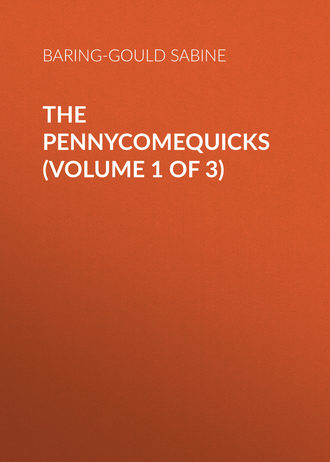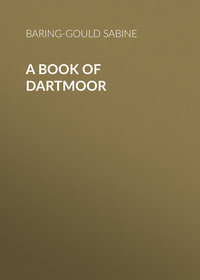
The Pennycomequicks (Volume 1 of 3)
She paused, to recover the control that was fast deserting her, as the delicate glow of colour in her face had now left it. 'It is not my uncle. I looked at his hands. The head is – is not to be seen, nothing is distinguishable there – but the hands are not those of Mr. Pennycomequick.'
'In what does the difference consist?'
'I cannot describe it. I knew his hands well. He often let me take them in mine when I sat on the stool at his feet by the fire, and I have kissed them.' The clear tears rose in her eyes and rolled down her cheeks. 'I am quite sure – if those had been his dear hands that I saw on the bed this morning, I would have kissed them again, but I could not.' She shook her head, and shook away the drops from her cheeks. 'No – I could not.'
'Miss Cusworth,' said Philip, 'you are perhaps unaware of the great alteration that is produced by immersion for many hours.'
'They are not his hands. That is not uncle.'
She was so conspicuously sincere, so sincerely distressed, that Philip relaxed his cold manner towards her, and said in a gentle tone:
'Did my uncle wear a ring? There was none on the hands of the man found yesterday.'
'No; he wore no ring.'
'With what did he seal his letters?'
'Oh! he had a brass seal with his initials on it, with a handle, that was in his pen-tray. He used to joke about it, and say he was a J.P. without the Queen's commission.'
'For my own part,' said Philip, 'I am beyond forming an opinion, as I have seen my uncle but once since I was a boy, and then under circumstances precluding exact observation.'
Salome said nothing to this, but heaved a long breath. Presently Philip said:
'Your mother – has she been taken upstairs?'
'Oh no!' exclaimed Salome, excited as by a fresh terror. 'You do not know my mother. She has heart complaint, and we have to be most careful not unduly to excite and alarm her. She has suffered much on account of what has taken place; and the shock of seeing – ' She shivered. 'It cannot be.'
'And your sister?'
'She turned faint when brought to the door, and I could not persuade her to enter. She has been much tried by the German invasion of France, and her hurried journey.'
'Is there anything further you have to say?'
'No; Mrs. Sidebottom is wrong, that is all.'
Philip withdrew.
The girl had gained in his estimation. There was strength in her such as lacked in her sister. She must have had courage and determination to go by herself into the room where lay the mutilated corpse, and she had formed her own opinion, independently, and held to it with a firmness there was no breaking down.
Philip ascended the stairs thoughtfully. It had seemed to him at the time that his aunt had rushed at identification with undue precipitation; still, she was the sister of Uncle Jeremiah, and therefore better capable than anyone else. Now he was himself uncertain.
When he entered the study where Mrs. Sidebottom was, she saluted him with:
'Well, so you have had your interview with Salome. She has been hanging about the hall all the morning for the purpose of catching you.'
Philip made no reply. Her light tone jarred on his feelings, coming as he did from the presence of a girl full of sadness.
'Has she gained you over to her side?'
'Upon my word, I do not know what to think.'
'Fiddlesticks!' said Mrs. Sidebottom; 'she has made eyes at you. Girls with good eyes know how to use them; they are better advocates than their tongues.'
'The difficulty to identification seems to me insuperable.'
'Pshaw! I have no doubt at all. He had been to bed; he went out without his coat and waistcoat. He was last seen on the canal bank, not so very far from the place where the corpse was found. The body is discovered wearing the great-coat. I have told you how I explain that. I suppose Salome has made a point to you that the nightshirt was not that of Uncle Jeremiah? Her mother looked after his linen.'
'No; she said nothing of that.'
'But I identify the shirt.'
'You, aunt?'
'Yes; it is one I gave him.'
'You – gave him? An extraordinary present.'
'Not at all. I was his sister; and I know that an old bachelor's wardrobe would be in a sad state of neglect. I intended to replenish him with linen altogether.'
Philip was greatly surprised. He looked fixedly at his aunt, to make out whether she were speaking seriously. She dashed off, however, at once on another topic.
'That girl,' she said, 'naturally resisted the conclusions at which I have arrived.'
'Why naturally?'
'Oh, you greenhorn! Because if it be established that Jeremiah is dead, out goes the whole Cusworth brood. They have lived here and preyed on him so long that they cannot endure the notion of having to leave, and will fight tooth and nail against the establishment of his decease.'
'Not at all. You misjudge them. They allow that he is dead, but disbelieve in the identity of the corpse found with my uncle who is lost, which is another matter.'
'Out they shall go,' said Mrs. Sidebottom.
'It is painful for them to leave a house where they have been happy, and in which the young ladies have grown up from childhood.'
'Other people have to undergo painful experiences,' said his aunt; and again, 'Out they go.'
'Not at once.'
'As soon as the funeral is over.'
'But why act with such precipitation?'
'Because I cannot endure them. Do you remember the story of the Republican judge, when a gentleman contended before him for his paternal acres against a sans-culotte, who had appropriated them? "These acres," said the plaintiff, "have belonged to my family for four hundred years." "High time," said the judge, "that they should be transferred to others;" and he gave sentence for the defendant. These Cusworths have been in possession quite long enough. High time that they should budge, and make room for me.'
'But you must consider the feelings of the old lady. You have no excuse for acting peremptorily.'
'I shall inquire what wage she has received, pay her a month, and send her off. That is to say,' added Mrs. Sidebottom on further consideration, 'I will pay her as soon as I have got some of Jeremiah's money out of the bank.'
'And that cannot be touched till his will has been proved.'
'There is no will.'
'How do you know that?'
'I have searched every drawer, closet, and chest. I have looked everywhere. There is no will.'
'It will be at the lawyers'.'
'Jeremiah never had a lawyer. That was one of his fads.'
'Then at the bank.'
'I wrote to the bank the moment I heard of his death. I have received an answer. There is no will at the bank.'
'There is time enough to discuss this later.'
'No, there is not,' said Mrs. Sidebottom peremptorily. 'The factory must not be allowed to come to a stand, and the business to drift away. You have no claim.'
'That remains to be seen. If there be no will, I shall have a claim, and a pretty substantial one.'
'Your father withdrew his share from the concern. I did not. I have my interest in the business, and will see that it be kept up. Where is Lamb?'
'The captain will be here directly. Hush! I hear him in the hall.'
In another minute, Lambert Pennycomequick entered the room, very fresh, well dressed, and pleasant.
'Lamb!' exclaimed his mother, 'there is no will.'
'Then, I suppose,' said the captain, 'we shall have to take out an administration. I don't understand these things myself, but Cousin Philip is here on the spot to manage for us.'
'If there be no will,' explained Philip, 'you, Aunt Louisa, as sole surviving sister of Uncle Jeremiah, will have to act. You will have to take oath that he is dead, and that he died intestate. Then you will be granted administration as next of kin. If I had any doubt about his death, I would enter a caveatand prevent the grant; and then the death would have to be proved in solemn form in court. But I have no doubt that my uncle is dead, though I may think it an open matter whether the body in the other room be his.'
'And, if I am granted administration as nearest of kin, all the property comes to me?' said Mrs. Sidebottom.
'Not so – most certainly.'
'Why not? I am nearest. I alone have a stake in the mill. Yours was withdrawn long ago. I am his sister, you only a half-nephew.'
'For all that, you do not take everything. I have my share.'
'Well, if it must be, we will divide into three. I take a third in addition to what I have by my marriage settlement; Lamb has a third, and you the remainder.'
'Wrong again, aunt. Lambert is out of the running. The estate will be divided between you and me in equal portions.'
'This is monstrous. My Lambert is a nephew every whit as much as you.'
'Yes, but you intervene. Such is the law.'
Mrs. Sidebottom was silent for a moment. Then she said irritably: 'I wish now, heartily, that there had been a will. I know what Jeremiah's intentions were, and I would grieve to my heart's core to have them disregarded. In conscience, I could not act differently from his wishes. If he omitted to make a will, it was because he knew nothing of law, and supposed that everything would devolve to me, his sister. Philip, knowing the rectitude of your principles, I am sure you will decline to touch a penny of your uncle's inheritance. You know very well that he never forgave your father, and that he always regarded his leaving the business as an acquittal of all further obligations towards him.'
'I must put you out of doubt at once,' said Philip. 'I shall most certainly take my share.'
'I do not believe that my brother died without a will. I never will believe it. It will turn up somehow. These old fogies have their odd ways. Perhaps it is at the mill in his office desk. What a world of contrarieties we do live in! Those persons to whom we pin our faith as men of principle are just those who fail us. However, to turn to another matter. I presume that I am in authority here. You have no caveat to offer against that?'
'None at all.'
'Then out go the Cusworths, and at once.'
'Not at once. That is indecent. If you will have it so, after the funeral give them notice. You must act with humanity.'
'The girl is insolent. She has the temerity to dispute my assertion that the dead man is Jeremiah.'
'She is justified in forming her own opinion and expressing it.'
'Of course, you take her part. She has been ogling you with good effect. Lamb, will you go down and call her up? I must have a word with her at once, and ascertain the amount of wages her mother has received, and how much is due.'
'Remember,' said Philip, 'that Mrs. Baynes has come here from Normandy, and that Mrs. Cusworth is ill, and that houses are scarce at present in Mergatroyd.'
'Then let them go elsewhere. To Jericho, for all I care.'
Philip was very angry. He was offended at his aunt's insinuations about himself, and indignant at her want of feeling towards those who had been companions and friends to his uncle.
Lambert had left the room as desired.
'Aunt Louisa,' said Philip, 'I insist upon your acting with courtesy and consideration towards the Cusworths. I do not mean to threaten you; but I shall not tolerate conduct that appears to me as ill-judged as unjust. As you said yourself, we must remember and act upon the wishes of the deceased; and it would be contrary to them that the old lady and her daughters should be treated with disrespect and unkindness.'
'You leave me to deal with them,' said Mrs. Sidebottom, somewhat cowed by his manner.
'You know my opinion. You will find it not to your advantage to disregard it,' said Philip haughtily.
Mrs. Sidebottom shuffled her feet, and arranged her skirts, frowned, and examined her pocket-handkerchief, where she discovered an iron-mould.
Then Lambert reappeared with Salome, and as they entered the door, Philip turned towards it and took up his position near the girl, facing his aunt, as if to protect Salome from insolence and injustice. Mrs. Sidebottom understood the signification of the movement, bit her lips, and said with constraint, looking on the ground: 'May I ask you, Miss Cusworth, to favour us by taking a chair? There is no occasion for you to stand in my presence. I have taken the liberty to send for you, because my poor dear brother is dead, and as no reasonable doubt remains in any unprejudiced mind that his body has been found – '
Salome's lips closed. She looked at Philip, but said nothing. She had made her protest. One on this occasion would be superfluous.
'We desire in every way to act according to the wishes of my darling brother, whom it has pleased a beneficent Providence' – she wiped her eyes – 'to remove from this vale of tears. As his sister, knowing his inmost thoughts, the disposition of his most sacred wishes, his only confidant in the close of life, I may say I know what his intentions were as well as if he had left a will.'
'There is a will,' said Salome quietly.
'A will! – Where?'
'In my workbox.'
A silence ensued. Mrs. Sidebottom looked very blank.
'On the very night he died he gave it me to keep, and I put it away in my workbox, as I had nothing else that locked up. My workbox is in my room upstairs. Shall I fetch the will?'
'No,' said Philip, 'let it stay where it is till after the funeral.'
CHAPTER XII.
SURPRISES
When the funeral was over, and the family of Pennycomequick was assembled in the house of the deceased, or assumed to be deceased, manufacturer, Mrs. Sidebottom sent her compliments to Salome, with a request that she would favour her with an interview in the dining-room.
Mrs. Sidebottom was dressed in fresh black satin and crape that became her well, as her hair and face were fair. Of this she was aware, and she took the opportunity of surveying herself in every mirror that she passed. Really in her mourning she looked young again. The black seemed to produce on her much the same effect as the photographer's stipple, wherewith he effaces the wrinkles of the negative. It was as though the life of Pennycomequick were a capital of which, when Jeremiah lost hold, his heirs had taken possession. Not Mrs. Sidebottom only, but also her son seemed to have come in for a bequest of vitality. The captain looked brighter, less languid than he had for long.
Philip's suspicious nature had been displeased by the statement of Salome that the will was in her possession. It appeared to him strange that the old man should have entrusted so important a document to the care of a girl of nineteen or twenty. It roused in his mind that mistrust which had been laid. He asked whether the fact of this consignment did not show that the Cusworth family were deeply interested in the will; whether this taking possession of it were not the conclusion of a conspiracy to get the old man to make a testament altogether in their favour.
He did not, on this occasion, move to meet Salome when she entered the room, but took his position apart, with arms folded, and face imperturbable, and set hard, as if a frost had congealed it.
Philip was not by any means unconcerned as to the disposition of his uncle's property. He would have been raised above the passions and ambitions of human nature had he been unconcerned, for the disposition was likely to affect materially his whole after-life.
Philip was now aged thirty-four years, and was only a solicitor's clerk. The utmost he could expect, without a windfall, would be when well advanced in years to be taken into the firm of Pinch and Squeeze for his mastery of the details of the business. He would be incapable of purchasing a partnership, as he was wholly without capital. What means his father had possessed had been thrown away, and therewith his prospects.
Philip's only chance of recovering his proper position was through a bequest from the uncle whose will was about to be read.
If Jeremiah had died intestate, he would have come in for a share of the business, and for a good lump sum of money, for it is quite certain that his uncle had saved money. He might then have either purchased a partnership in a good legal house, or carried on the factory, remaining at Mergatroyd.
It was true that he knew nothing of the technique of linen weaving, but his training had taught him business habits, and he was confident that in a short time he would be able to master the ramifications of the business. There is a tool sold by ironmongers that contains in the handle, saw, file, gimlet, turnscrew, chisel, bradawl, and punch. The nozzle of the handle is provided with a grip that holds or discharges such of the tools as are required or done with. Thus the instrument can be converted at pleasure into whatever is desired.
A business education makes a man into such a convertible tool, ready, as required, to be saw, file, turnscrew, or punch. Philip was conscious of his mental flexibility, and confident that if he resolved to make a new departure, he could fit himself to it. The knowledge that he had been without means had not soured him as it had his father, but had hardened him. His profession had conduced, as this profession does in many cases, to foster in him a strong and touchy sense of rectitude. Brought into contact with mankind in its ignoble aspects, seeing its sordidness, selfishness, laxity of principle where self-interest is concerned, he had framed for himself a rigorous code of honour, from which nothing would make him swerve by a hair's-breadth.
In the past he had made no calculation on receiving anything from his uncle, but now that the possibility of his getting something was presented to him, he could not contemplate the decisive moment with equanimity. The tiger that has tasted human blood, ever after disdains the food that previously satisfied its maw; and the young lady who has been through a London season, or only ventured into a first ball, will not afterwards return to the sobriety and monotony of country life. If Philip had been left to plod on at Nottingham without expectations, he would have accommodated himself to his situation with dull resignation; but now that a prospect of independence had been dangled before his eyes, he could not return to his old career without intensified distaste.
Yet he was far from forming great hopes. He knew that Jeremiah had been a vindictive old man, never forgiving his brother a mistake which had cost that brother more suffering than it had Jeremiah. It was more probable that the old manufacturer would leave everything to his sister and her son, with whom he had always maintained unbroken connection, than that he should favour him. Whether Jeremiah liked and trusted his sister and her son, and to what extent he liked and trusted them, Philip had not the means of judging, that alone could be revealed by the will.
If he should be disappointed, his disappointment would be more grievous to bear than he cared to acknowledge to himself. He was, indeed, angry with himself for feeling any flutter of hope. If he should be disappointed, he would return to Nottingham, to his former routine of life, and spend the rest of it in a subordinate position, destitute of that brightness and ease for which a man of education craves as an atmosphere in which his soul can breathe and expand. He did not desire ease because indolent, but to obtain scope for his faculties to develop in other directions than those to which they were professionally turned; and to polish the other facets of the inner self than those exposed to the daily grindstone. He would like to buy books, to take a holiday on the Continent, to purchase small artistic treasures, to be able to rise out of the contracted circle of petty clerk-life, with all its small prejudices and narrow interests.
For fifteen years he had lived this life that was uncongenial, and unless his uncle's money gave him wings to rise out of it, he must remain in this Stymphalian bog. Consequently it was with a beating heart, and with inward fluctuations of hope and fear, that he awaited the decision; but none of this unrest could be seen in his face, that did not bear in it a sign of expectation.
As Salome entered, Mrs. Sidebottom waved to her to take a seat. The girl, however, with a slight acknowledgment, stepped up to Philip, and extending to him the will, said: 'It was given to me to keep safely, should anything occur. I cannot even now resign it absolutely, as Mr. Pennycomequick told me that I was to keep it and prove it.'
'You prove it!' exclaimed Philip, glancing at her suspiciously.
'You!' cried Mrs. Sidebottom. 'Fiddlesticks! That is to say, impossible.'
'You must remain in the room, Miss Cusworth,' said Philip, 'whilst the will is read, after which we will remit it to your charge.'
'I object to such as are not of the family being present,' said Mrs. Sidebottom.
'Your objection must be put aside,' answered Philip. 'As Miss Cusworth has been entrusted with the document, and required to prove it, she must remain.'
Mrs. Sidebottom tossed her head.
Philip drew his penknife from his pocket, opened it, and leisurely cut through the top of the envelope, extracted the document, and unfolded it. He glanced at the heading, and then, with lawyer-like instinct, at the end, then, with a sharp look of surprise at Salome, who waited with lowered eyes, he said: 'This is worthless. The signature has been torn away.'
'Torn away!' echoed Mrs. Sidebottom.
Salome looked up in astonishment.
'This is a cancelled will,' said Philip. 'It is of no more value than waste paper. When do you say my uncle entrusted it to you?'
'Shortly before he left the house on the night that he disappeared. I am quite sure he thought it was of importance, from his manner towards me in commending it. He said it was a trust, an important trust.'
'Then,' said Philip, 'there is some mystery behind unsolved.'
'Read it,' urged Mrs. Sidebottom; 'and see if that will clear it up.'
'I will read it, certainly,' said Philip; 'but it is a document entirely devoid of legal force.'
Philip began to run his eye over it before reading aloud.
'Well, upon my word,' said Mrs. Sidebottom, 'you are inclined to keep us on tenterhooks. The will, if not valid, is still interesting, no doubt.'
'This,' said Philip, in a tone that had harshness in it, 'this is a most extraordinary document. It is in the first place clearly made up from some of those formulas which are found in popular handbooks; for aught I know picked out of "Inquire Within for Everything," or the "Family Save-All." The last portion is also clearly taken from no formula at all, but is the expression of my uncle's peculiar idiosyncrasies.'
'Well, read it, and pass your comments on it later,' said Mrs. Sidebottom, shifting her position in her seat and rearranging her skirts.
Before reading, Philip cast a searching glance at Salome. He now seated himself at the table, and proceeded to read:
'I, Jeremiah Pennycomequick, of Mergatroyd, in the County of York, and the West Riding of said county, manufacturer, being in sound health and in full possession of my faculties, do give, bequeath, and devise all the real and personal estate of which I shall be possessed or entitled at the time of my decease, together with my factory, my house with garden, which are all leasehold for twenty-one years, together with all the appurtenances thereof, unto Salome Cusworth, my adopted daughter, absolutely; chargeable, however, with such sum annually to be paid out of the profits, pro rata, to my half-sister, Louisa Sidebottom, as was agreed by her marriage settlement. And I further direct and bequeath to my nephew, Lambert Sidebottom, and to my nephew, Philip Pennycomequick, to each severally an annuity of one hundred pounds, to be paid to the said Lambert Sidebottom and the said Philip Pennycomequick during their respective lives, in half-quarterly payments. And I hereby request my executor to invest a sufficient sum in the purchase of such annuities out of the moneys arising from my personal estate. And I further appoint the aforesaid Salome Cusworth, my adopted daughter, sole executrix of my will, and revoke all former wills by me at any time heretofore made.
'And whereas I have been during the whole course of my lifetime an enemy to lawsuits, and what little I leave I desire may not be squandered away on the gentlemen of the long robe, for whom all the veneration I have is at a distance, and wishing that there was more justice and less law in the world, I devise that should any legatee trouble my executor by going to law, by commencing any suit of law, in any tribunal whatsoever, the said person be deprived of the benefit of the legacy hereby bequeathed.'3









